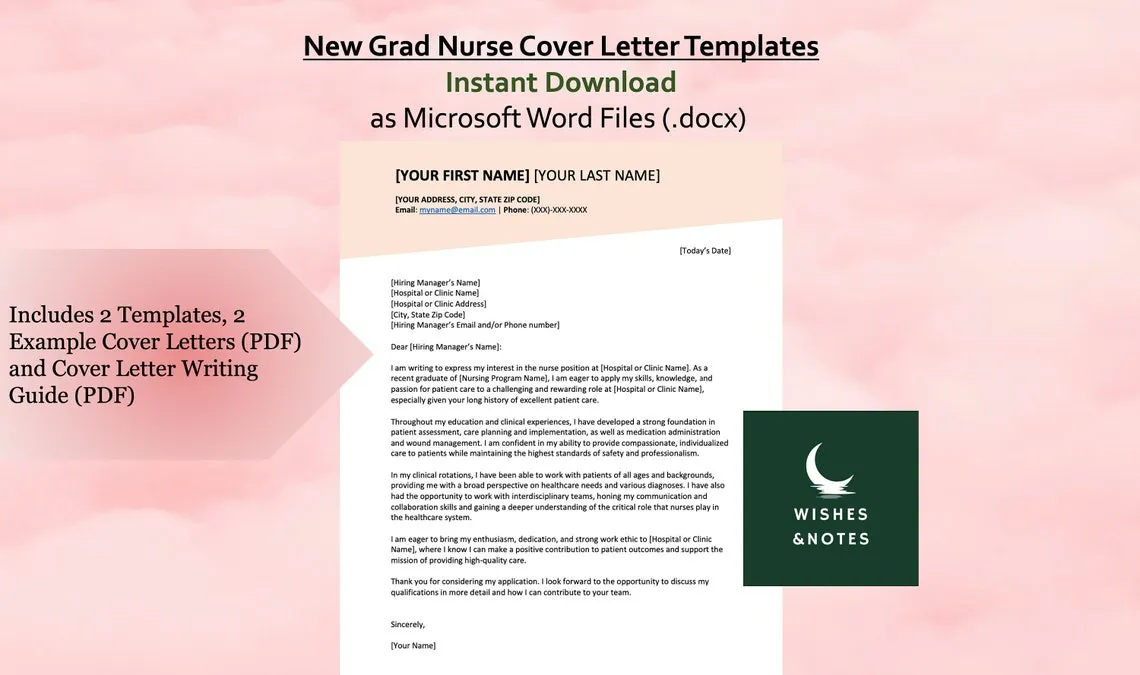Understanding the Nursing Cover Letter
A nursing cover letter is a crucial document that accompanies your resume when applying for nursing positions. It serves as your introduction to the hiring manager, providing a snapshot of your qualifications, experiences, and enthusiasm for the role. Unlike a resume, which lists your skills and experiences, a cover letter allows you to tell your story, demonstrating how your unique background aligns with the specific requirements of the job and the values of the healthcare facility. For new graduates, a well-crafted cover letter can be particularly important, as it offers an opportunity to highlight clinical experiences, academic achievements, and personal attributes that make you a strong candidate, even with limited professional experience. Think of it as your chance to make a compelling first impression and set yourself apart from other applicants.
Why a Cover Letter Matters for New Grads
As a new graduate nurse, you may be competing with experienced professionals for coveted positions. A cover letter gives you a distinct advantage by allowing you to showcase your potential and passion for nursing. It’s an opportunity to address the gap in professional experience by emphasizing your clinical rotations, academic achievements, and any volunteer or extracurricular activities that demonstrate your commitment to patient care and professional growth. The cover letter allows you to articulate your career goals and how the specific nursing role aligns with those aspirations, showcasing your initiative and forward-thinking approach. Furthermore, it highlights your unique strengths and personality, making you more than just a list of qualifications on a resume, and helping the hiring manager envision you as a valuable addition to their team. It’s your chance to make a personal connection and express why you’re the ideal candidate for this specific opportunity.
Key Components of a Nursing Cover Letter
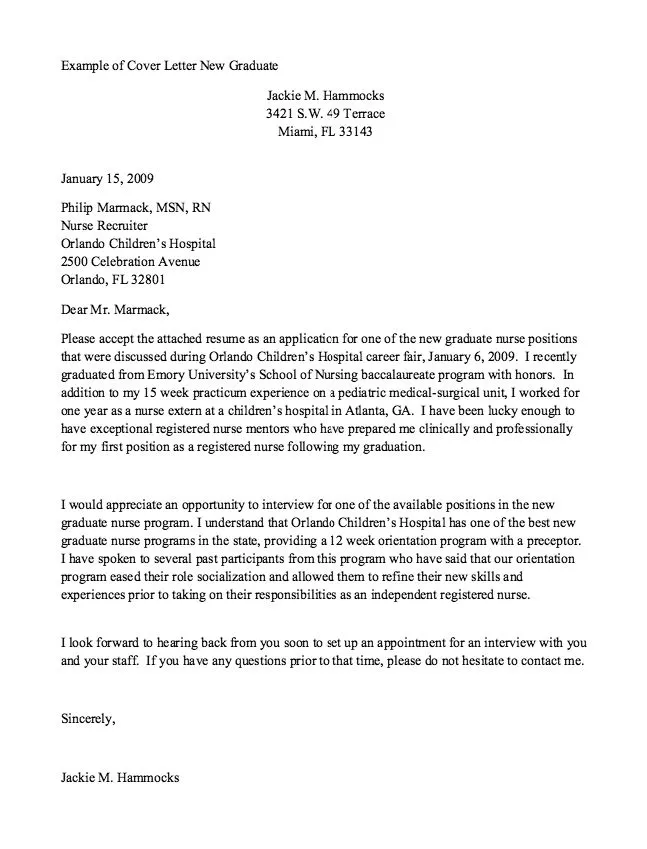
A strong nursing cover letter is composed of several key components, each serving a specific purpose in presenting you as a qualified and enthusiastic candidate. These elements work together to create a cohesive narrative that showcases your skills, experiences, and personality. The structure is usually starts with your contact information and the date, followed by the hiring manager’s information. Next comes the salutation and the body paragraphs. Finally the closing and your signature.
Contact Information and Formatting
Begin your cover letter with your full name, address, phone number, and professional email address. Ensure this information is easily visible at the top of the letter. Use a professional font like Times New Roman, Arial, or Calibri, and maintain a consistent font size (typically 11 or 12 points). Left-align your text and use single spacing within paragraphs, with a blank line between paragraphs to improve readability. Ensure your formatting is clean and professional, making a positive first impression on the hiring manager.
Addressing the Hiring Manager
Address your cover letter to a specific person whenever possible. Research the healthcare facility’s website or use LinkedIn to find the hiring manager’s name and title. A personalized salutation, such as “Dear Ms. Smith,” demonstrates that you’ve taken the initiative to learn about the organization and are genuinely interested in the opportunity. If you are unable to find a specific name, use a professional greeting such as “Dear Hiring Manager”.
Highlighting Your Nursing Skills and Experience
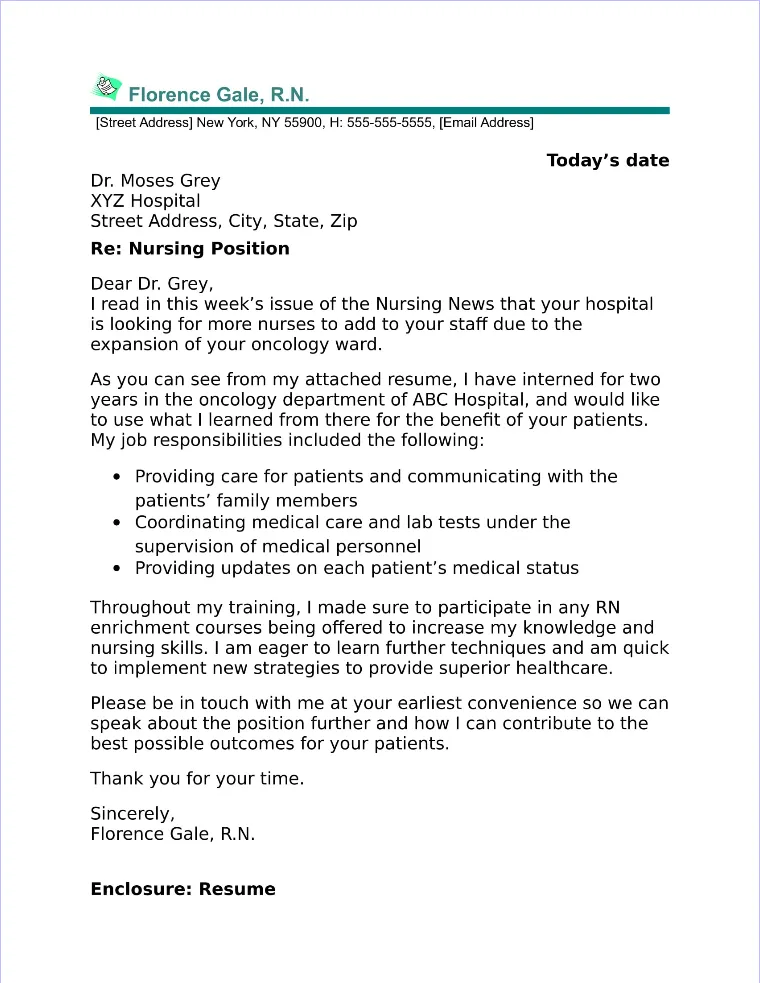
The body paragraphs are where you showcase your skills, experiences, and passion for nursing. Start with a strong opening that grabs the reader’s attention and states your purpose for writing. Then, use the body paragraphs to highlight your most relevant skills, experiences, and achievements, using specific examples from your clinical rotations, coursework, or volunteer work. Emphasize any specialized skills, such as critical care, pediatrics, or surgical nursing, that align with the job description. Be sure to quantify your achievements whenever possible, using numbers to demonstrate your impact.
Showcasing Relevant Clinical Experience
As a new grad, your clinical rotations are your primary source of experience. In your cover letter, provide details about the specific units and patient populations you worked with. Highlight any skills you developed or practiced, such as medication administration, patient assessment, or wound care. Share any instances where you took initiative, solved problems, or provided exceptional patient care. Tailor your examples to match the requirements outlined in the job description. For example, if the position is in an ICU, emphasize your experience with critically ill patients, ventilators, and advanced monitoring equipment. Be specific and provide concrete examples to demonstrate your competence.
Quantifying Your Achievements
Whenever possible, quantify your achievements to demonstrate your impact. Instead of saying, “I improved patient satisfaction,” state “Improved patient satisfaction scores by 15% through implementing a new communication strategy.” Use numbers and data to showcase your skills and effectiveness. For example, mention the number of patients you cared for, the frequency with which you performed specific procedures, or any improvements you achieved in patient outcomes. This provides concrete evidence of your abilities and helps the hiring manager understand your contributions.
Emphasizing Soft Skills and Personal Attributes
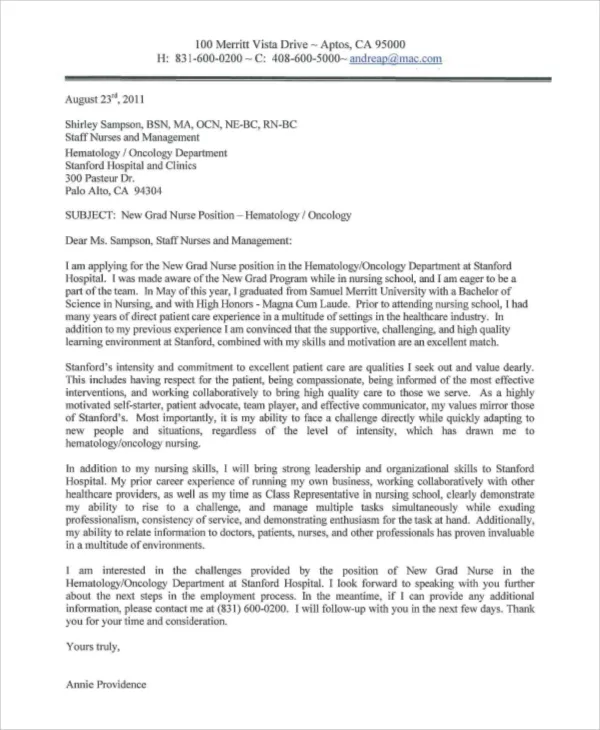
In addition to your technical skills, highlight your soft skills and personal attributes that make you a great nurse. Mention your communication skills, teamwork abilities, problem-solving skills, and ability to adapt to challenging situations. Provide examples of how you’ve demonstrated these skills in your clinical rotations or other experiences. Showcasing your personality and enthusiasm for nursing can make a lasting impression on the hiring manager and set you apart from other candidates. Mention any relevant volunteer experience, leadership roles, or extracurricular activities that demonstrate your commitment to the nursing profession.
Tailoring Your Letter to the Job Description
Carefully review the job description and tailor your cover letter to match the specific requirements and qualifications. Highlight the skills and experiences that align with the job description’s needs. Use keywords from the job posting throughout your letter to demonstrate that you understand the role’s expectations. Explain how your skills and experiences make you a strong fit for the position. Avoid using a generic cover letter; customize each letter to the specific job and healthcare facility.
Researching the Healthcare Facility
Before writing your cover letter, research the healthcare facility to understand its mission, values, and culture. Visit their website, read about their services, and learn about their approach to patient care. Mention something specific you admire about the facility or explain why you are drawn to work there. This demonstrates your genuine interest and shows that you’ve taken the time to learn about the organization.
Matching Skills with Requirements
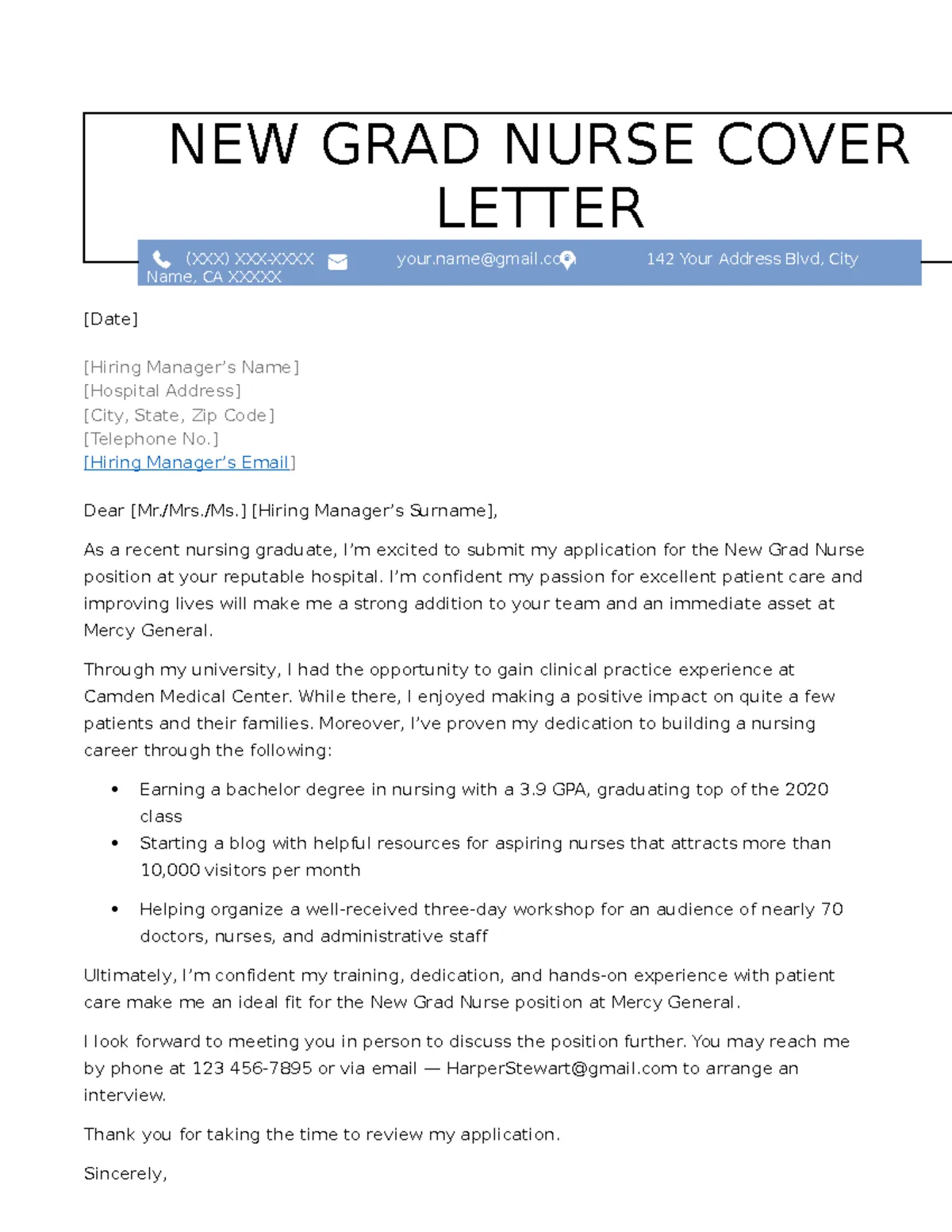
Carefully compare your skills and experiences with the requirements listed in the job description. Identify the key skills and qualifications the employer is seeking and address them in your cover letter. Provide specific examples that demonstrate how you possess these skills. If there are any gaps in your experience, address them by highlighting your transferable skills or explaining how you are eager to learn and grow in the role. Show the employer how your skills align with their needs.
The Body Paragraphs Crafting the Narrative
The body paragraphs are the core of your cover letter, where you expand on your qualifications and demonstrate your value to the employer. Organize your body paragraphs strategically to create a compelling narrative that showcases your skills and experiences in a logical and engaging manner. Use a clear and concise writing style, with each paragraph focusing on a specific aspect of your qualifications or experiences. Provide concrete examples to support your claims, using the STAR method (Situation, Task, Action, Result) to describe your accomplishments. Tailor your content to match the requirements of the specific job and healthcare facility. Aim for a tone that is professional, enthusiastic, and reflects your genuine interest in the role.
Writing a Strong Opening
Your opening paragraph should immediately grab the reader’s attention and state your purpose for writing. Clearly state the position you are applying for and how you learned about it. Briefly mention why you are excited about the opportunity and what makes you a strong candidate. Consider mentioning a key skill or accomplishment that aligns with the job requirements to create an immediate impact. Avoid generic openings and strive for a unique and engaging introduction that piques the hiring manager’s interest and encourages them to read further.
Demonstrating Passion for Nursing
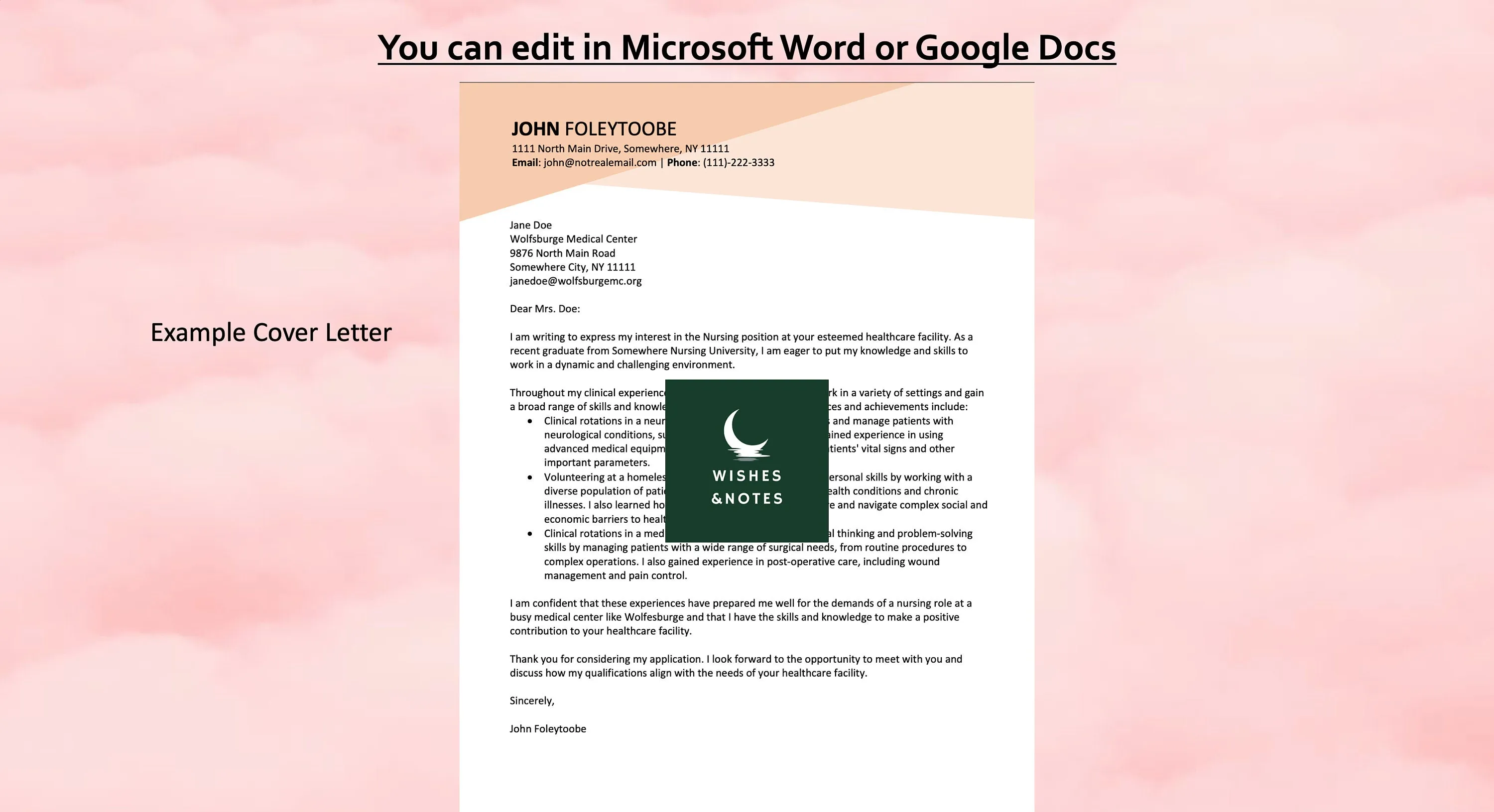
Throughout your cover letter, demonstrate your passion for nursing. Share what motivates you to be a nurse, such as your desire to help others, your interest in patient care, or your commitment to the nursing profession. Highlight any specific areas of nursing that you are passionate about, such as critical care, pediatrics, or geriatrics. Show your enthusiasm for the opportunity and express your eagerness to contribute to the healthcare facility’s mission.
Showcasing Your Clinical Skills and Experiences
The bulk of your body paragraphs should focus on your clinical skills and experiences. Provide specific examples of your work during clinical rotations, including the types of patients you cared for, the procedures you performed, and any challenges you overcame. Highlight any achievements or positive outcomes, such as improved patient outcomes, reduced medication errors, or enhanced patient satisfaction. Use the STAR method (Situation, Task, Action, Result) to provide a clear and concise account of your experiences. Tailor your examples to the requirements of the job description and demonstrate how your skills align with the employer’s needs.
Explaining Your Motivation
In your cover letter, clearly articulate why you are interested in this specific nursing position and why you want to work at this healthcare facility. Discuss your career goals and how this opportunity aligns with those goals. Share what you admire about the facility, such as its mission, values, or reputation. Explain why you believe you would be a valuable asset to their team. This demonstrates your enthusiasm and makes a personal connection with the hiring manager.
Closing the Cover Letter
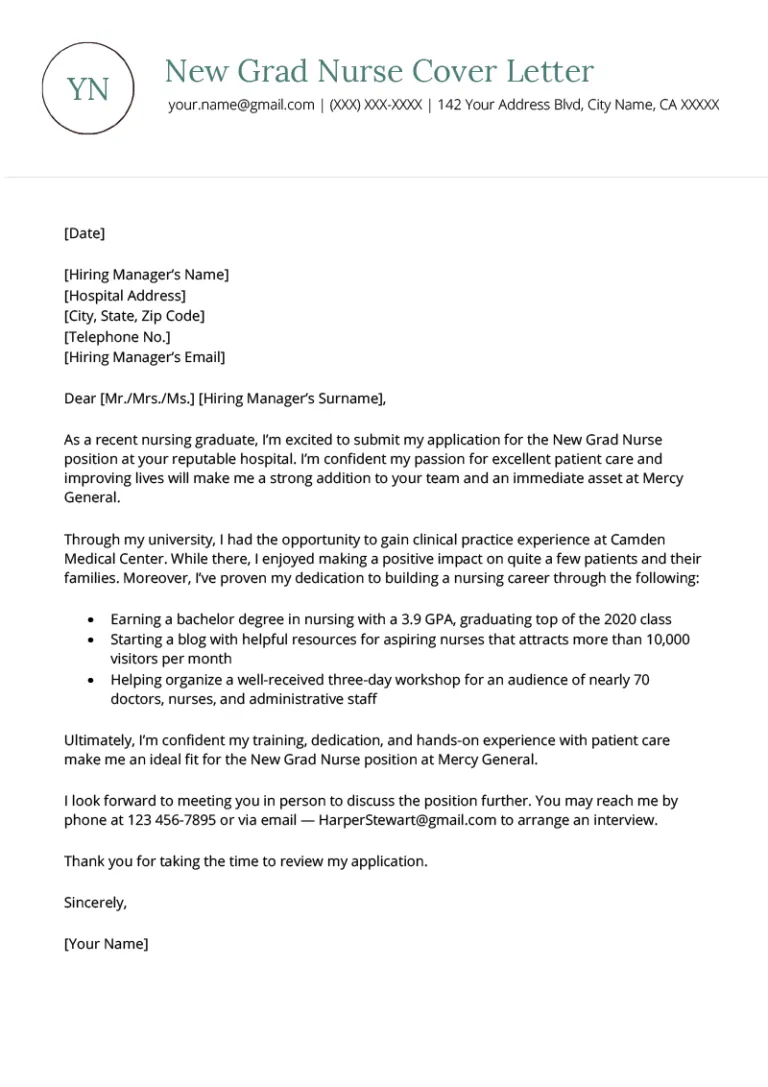
Your closing should be professional and leave a positive impression. Express your gratitude for the opportunity to be considered for the position and reiterate your enthusiasm for the role. Indicate your interest in an interview and provide your contact information again. Proofread the closing carefully for any errors and ensure it reflects your professionalism and eagerness to contribute to the healthcare facility.
Expressing Gratitude and Enthusiasm
Express your gratitude to the hiring manager for considering your application and express your enthusiasm for the opportunity. Reiterate your interest in the position and your confidence that you would be a valuable asset to their team. Show your appreciation for their time and consideration. This demonstrates your professionalism and leaves a positive impression.
Requesting an Interview and Providing Contact Information
In your closing, request an interview and provide your contact information again. Make it easy for the hiring manager to reach you by including your phone number and professional email address. State your availability for an interview and express your eagerness to discuss your qualifications further. This shows your initiative and makes it easy for the employer to move forward with the hiring process. Thank the hiring manager for their time and consideration one last time.
Proofreading and Editing Your Cover Letter
Proofreading and editing your cover letter is essential to ensure it is error-free and professionally presented. Carefully review your letter for any spelling, grammar, or punctuation errors. Pay close attention to sentence structure, word choice, and formatting. A polished cover letter demonstrates your attention to detail and professionalism, leaving a positive impression on the hiring manager. Take your time and go over every detail to ensure accuracy. It’s one of the most important parts of the process.
Ensuring Accuracy and Professionalism
Ensure that all your information is accurate and professional. Double-check the hiring manager’s name, job title, and the healthcare facility’s name. Verify that your contact information is correct. Use a professional email address and avoid any slang or informal language. Maintain a positive and professional tone throughout the letter. Present yourself as a polished and well-prepared candidate.
Checking for Grammar and Spelling Errors
Carefully check your cover letter for any grammar and spelling errors. Use spell-check and grammar-check tools to catch any mistakes. However, don’t rely solely on these tools; also, read your cover letter aloud to catch any errors that may be missed by automated software. Ask a friend, family member, or career counselor to review your letter and provide feedback. A polished, error-free cover letter demonstrates your attention to detail and professionalism.
Seeking Feedback from Others
Seek feedback from others to improve your cover letter. Ask a trusted friend, family member, career counselor, or professor to review your letter and provide constructive criticism. Their feedback can help you identify areas for improvement, such as clarity, tone, and content. Be open to their suggestions and make revisions based on their feedback. Getting a second opinion can significantly improve the quality of your cover letter and increase your chances of getting an interview. The best practice is to show it to someone and ask for their opinion on it. Don’t be afraid to get help.
Top 5 Cover Letter Tips for New Grad Nurses
Crafting a compelling cover letter is crucial for new grad nurses seeking to land their first job. To help you stand out from the competition, here are the top 5 cover letter tips to help guide you on the path to success.
Focus on Your Clinical Experience
Highlight the experiences and skills you have developed during your clinical rotations. This includes your interactions with patients, any procedures you performed, and the types of conditions you encountered. For a new graduate, these experiences are the most relevant proof of your abilities, so be sure to focus on them.
Highlight Your Skills and Abilities
When describing your clinical experiences, be sure to include the skills and abilities you developed or practiced during that time. Did you use specific technologies, provide patient education, or work with a diverse population of patients? Highlight those skills in your cover letter to showcase your talents.
Showcase Your Personality
It’s important to express your personality in your cover letter. Your letter isn’t just a list of your accomplishments. It also gives you the opportunity to make a personal connection with the hiring manager. This is your chance to show them who you are and why you are a good fit for the role and the healthcare facility. This adds another dimension to your application and can help you stand out from other candidates.
Proofread and Edit Carefully
Proofreading and editing are essential steps that can make or break your application. Be sure to check your cover letter for any grammar or spelling errors and ensure your formatting is consistent and professional. Consider seeking a second opinion from a trusted friend, family member, or career counselor.
Follow Up After Submission
After submitting your cover letter and resume, follow up with the hiring manager to express your continued interest in the position. You can send a brief email a week or two after submitting your application to reiterate your interest. Be sure to mention the position you applied for and thank them for their time and consideration.
